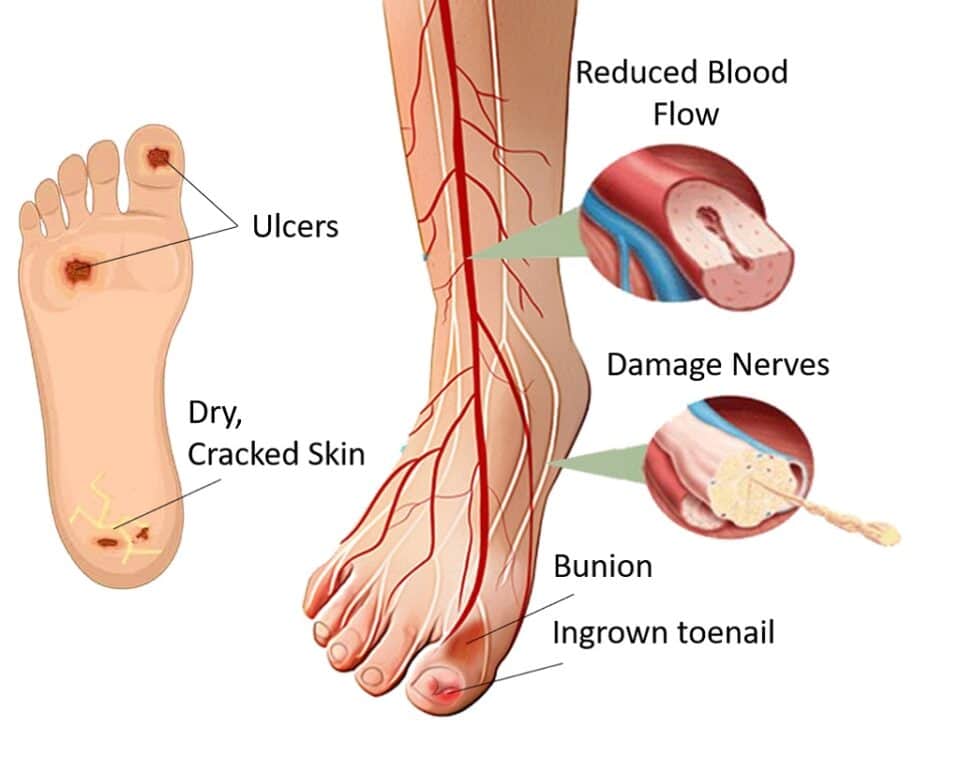Diabetic Foot Assessment
Diabetics are at a higher risk of foot injury. Find our how a diabetic foot assessment can help you.
How Does Diabetes Affect
Your Feet
Diabetes can have significant effects on the feet due to its impact on the nerves and blood vessels, which can lead to various foot complications. Here are some ways diabetes can affect your feet:
Neuropathy: Diabetes can cause nerve damage, known as diabetic neuropathy. This condition can lead to loss of sensation in the feet, making it difficult for individuals to feel pain, temperature changes, or even injuries.
Reduced blood flow: Diabetes can damage blood vessels and impair blood circulation, particularly to the extremities like the feet. Poor blood flow can hinder the body’s ability to heal, leading to slow wound healing and an increased risk of infection.
Foot ulcers: Due to neuropathy and reduced blood flow, people with diabetes are at a higher risk of developing foot ulcers.
Infections: Due to the combined effects of neuropathy and reduced blood flow, infections can develop more easily and spread rapidly in the feet.

See How Our Podiatrist's Can Help With Diabetic Feet

Conveniently
Located Clinic
5 Convenient Locations Across Sydney

EXPERIENCE
Treated Over 30,000 Patients

Diabetic
Foot Testing

New Patient
Offer
New Patient Offer – $15 OFF First Visit
See what people are saying about us on Google
Why See a Podiatrist
When You Have Diabetes?
Early detection and proactive foot care can significantly improve the quality of life for diabetic patients, reducing the risk of severe foot-related problems and enhancing overall well-being.
What's Involved In a Diabetic Foot Assessment
Our Podiatrists will review your medical history, including your diabetic management, any previous foot issues or complications, and any relevant medications.
This involves checking for loss of sensation in the feet by using a tuning fork, monofilament (a filament-like device), or other specialised tools to test your ability to feel touch, vibration, and temperature changes.
Our Podiatrists will examine pulses in the feet and lower legs to assess blood circulation and identify any signs of peripheral arterial disease.
The podiatrist will review the patient’s footwear to ensure it provides adequate support and protection for their feet.
Patients will receive guidance on proper foot hygiene, nail care, and how to recognise early signs of foot problems
If you have any foot ulcers or wounds, our podiatrist’s will evaluate the severity, assess for infection, and recommend appropriate wound care.
Observing how you walk (gait analysis) can help identify any issues with foot mechanics that may contribute to foot problems.
Based on the assessment findings, our podiatrist’s will develop an individualised foot care plan, which may include recommendations for footwear, wound care, exercises, and other preventive measures.
If necessary, our podiatrist’s may refer you to other specialists, such as vascular surgeons or wound care experts, for further evaluation and treatment.

Successful Treatments

Get Back To Activity Sooner

Evidence Based Approach

Walk Pain Free Again

You Are In Safe Hands







